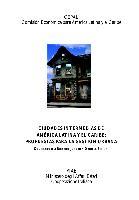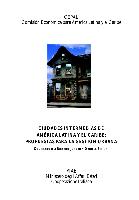Proyecto Gestión Urbana en Ciudades Intermedias Seleccionadas de América Latina ITA/95/S71
Proyecto Gestión Urbana en Ciudades Intermedias Seleccionadas de América Latina ITA/95/S71
Prefacio En 1990, Italia se convirtió en uno de los estados miembros de la Comisión Económica para América Latina y el Caribe y coincidentemente con ese evento, se preparó la primera versión del Proyecto 'Gestión Urbana en Ciudades Intermedias de América Latina y el Caribe' (GUCI).…
The population of Latin America is now largely urban. By 1990, 72 percent of the people of the region were living in cities. By 2020, the urban population could reach 83 percent. With increasing urbanization, the region faces problems of poverty, nutrition, and health that are somewhat different…
This booklet outlines the natural and human forces which impact beach erosion, the historic rate of change between 1985 and 1999 in Grenada, and practical steps to help.
Analyses two examples of changing institution-resource access relationships in Africa and Latin America. The Africa case (Kakamega, Western Kenya) highlights the resource endowments and problems associated with the participation of individuals in multiple institutions, whereas the Latin America…
The ultimately disappointing results of past redistributive reforms caused contemporary policy-makers in Latin America to search for alternatives. In recent years, the issue of transforming tenure structure through the market mechanism has moved into the spotlight. This paper argues that it is…
Mexican rural reform has questioned the role of the peasantry and private national producers in agriculture. The reform followed a neoliberal paradigm for incorporating the nation into the global village. As part of a government strategy, land reform in Mexico aims to change entrepreneurial and…
Reunión Regional de Ministros y Autoridades Máximas del Sector de la Vivienda y Urbanismo de América Latina y el Caribe
In recent years, the countries of Latin America have made radical changes in their development strategies, including decentralization of government, privatization, and deregulation of markets. These changes have already affected the livelihoods of millions of the region’s inhabitants and promise…
This paper considers the evidence surrounding the popular view that common property management regimes (CPMRs) of forest management in Latin America must inevitably break down in the face of economic and demographic pressures. The evidence shows that there have been both positive and negative…






